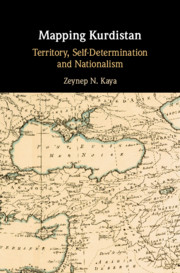Book contents
- Mapping Kurdistan
- Mapping Kurdistan
- Copyright page
- Dedication
- Contents
- Maps
- Acknowledgements
- Note on Text
- Abbreviations
- Introduction
- 1 Kurdish Territoriality under Ottoman Rule
- 2 Orientalist Views of National Identity and Colonial Maps of Kurdistan
- 3 Wilsonian Self-Determination
- 4 Kurdish Nationalism during Decolonisation and the Cold War
- 5 Kurds and the International Society after the Cold War
- 6 Kurdish Diaspora
- Conclusion
- Bibliography
- Index
5 - Kurds and the International Society after the Cold War
Published online by Cambridge University Press: 12 June 2020
- Mapping Kurdistan
- Mapping Kurdistan
- Copyright page
- Dedication
- Contents
- Maps
- Acknowledgements
- Note on Text
- Abbreviations
- Introduction
- 1 Kurdish Territoriality under Ottoman Rule
- 2 Orientalist Views of National Identity and Colonial Maps of Kurdistan
- 3 Wilsonian Self-Determination
- 4 Kurdish Nationalism during Decolonisation and the Cold War
- 5 Kurds and the International Society after the Cold War
- 6 Kurdish Diaspora
- Conclusion
- Bibliography
- Index
Summary
The post–Cold War era is when the formation of new states or autonomous regions based on national or ethnic identity gained a new momentum following developments in the ex-USSR and Former Republic of Yugoslavia. The UN Security Council adopted a resolution declaring that states that suppress cultural and political rights of their citizens based on communal identity lose international legitimacy. This, in turn, empowered ethnic groups who were suppressed and whose human rights were violated. It also led to the revival of Wilsonian self-determination, but in a different format, and in this period when the legitimacy of states is questioned as never before through labels such as authoritarian, dictatorial, failed or weak states. Kurdish demands for statehood gained a new momentum in this new era. As a signifier of this trend, the de facto autonomous Kurdish region of Iraq emerged in 1991 and became official in 2005 with the collapse of the Iraqi state and the formation of a federal state. Other Kurdish parties, such as the PKK, shifted their ideological ground and increased their appeal among Kurds. This chapter explains how Kurdish political actors in the Middle East utilised the new international normative framework post-1990 to frame their nationalist self-determination claims within the discourses of justice, human rights and democracy.
- Type
- Chapter
- Information
- Mapping KurdistanTerritory, Self-Determination and Nationalism, pp. 130 - 158Publisher: Cambridge University PressPrint publication year: 2020



